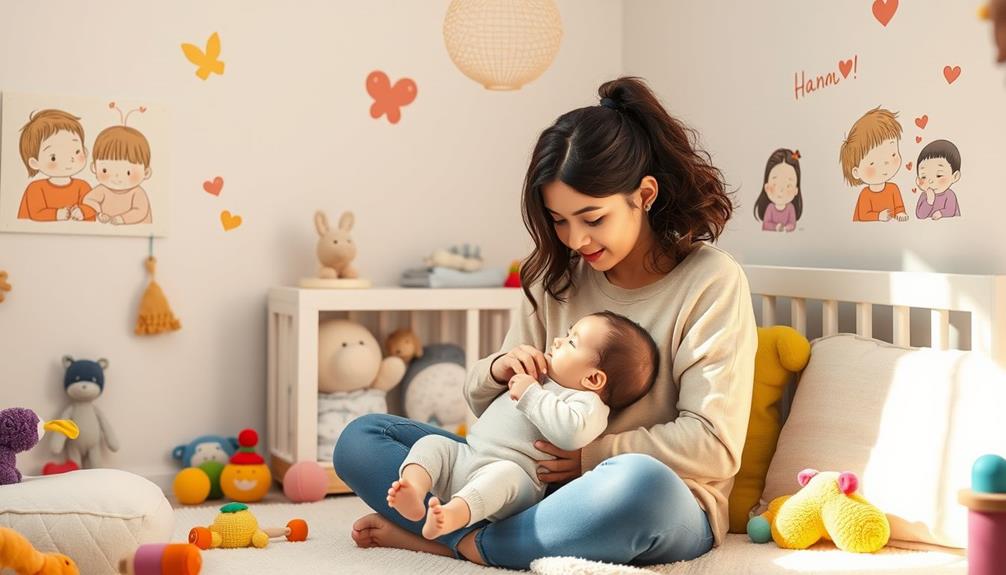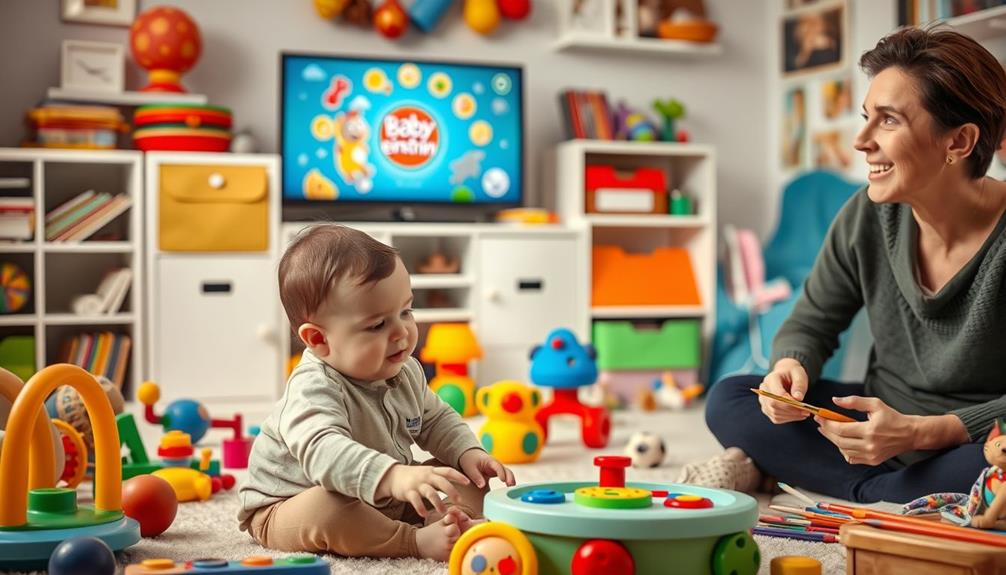Let’s celebrate Mom’s upcoming birthday in a special way by showering her with sincere praises that demonstrate our deep gratitude for her unwavering love and the significant influence she has on our lives. Let’s honor her as the extraordinary nurturer of family bonds, the embodiment of poise and sophistication, our source of guidance through life’s obstacles, and the wellspring of constant laughter and happiness in our household. Let’s demonstrate to her the value of her strength, perseverance, and selflessness to us. Our heartfelt compliments will surely make her day truly memorable.
Key Takeaways
- Celebrate Mom's role as the amazing gardener nurturing family love with kindness and warmth.
- Acknowledge Mom's elegance and grace, a timeless reflection of beauty and charm.
- Recognize Mom as the architect of dreams, guiding with strength and unwavering support.
- Celebrate Mom's infectious laughter and joy that fills our home with warmth and happiness.
- Appreciate Mom's strength and resilience, inspiring us to face challenges with courage and determination.
Family Love Recognition

We celebrate Mom's role as the amazing gardener cultivating family love. She carefully tends to the seeds of love, nurturing them with kindness and warmth. Each gesture, each smile, each moment shared is like a drop of water feeding the roots of our family bond.
Mom's love is a beacon, guiding us through life's twists and turns. Her unwavering commitment to our happiness blooms into a beautiful garden of memories that we treasure. The love she plants grows strong and resilient, weathering any storm that comes our way.
Today, as we celebrate Mom's birthday, we honor the love she's sown, grateful for the flourishing garden of family love she's cultivated.
Graceful Tribute to Elegance

Mom's elegance shines brightly, a timeless reflection of grace and charm in our lives. Her poise is a masterpiece, leaving a lasting impression on all who know her. With each step she takes, there's a sense of beauty and sophistication that radiates effortlessly.
Mom's charm isn't just in her appearance but in the way she carries herself with dignity and kindness. Her grace is a gift that she shares with us every day, reminding us of the importance of elegance in our lives.
We're truly blessed to have such a remarkable woman in our lives, whose elegance is a beacon of inspiration and a symbol of timeless beauty.
Leadership and Support Acknowledgment

Recognizing the pivotal role that mom plays as the architect of our dreams and the captain of our family ship, we celebrate her leadership and unwavering support.
Mom's guidance and strength have been the steady force that propels us forward through life's challenges. Her unwavering belief in our potential and relentless encouragement have shaped us into the individuals we're today.
Like a beacon in the storm, she's navigated us through turbulent waters, instilling in us the values of resilience and determination. Mom's leadership inspires us to reach for the stars and never give up on our aspirations.
Today, on her birthday, we honor her for being the cornerstone of our foundation, the one who stands beside us through thick and thin, guiding us with love and unwavering support.
Laughter and Joy Celebration

Celebrating the infectious spirit of laughter and joy that radiates from mom's presence. Mom's laughter is like a symphony that fills our home with warmth and happiness. Her joyful spirit is contagious, spreading smiles wherever she goes.
As we honor her on this special day, let's revel in the moments of shared laughter and pure joy that she brings into our lives.
- Mom's laughter lights up our hearts with its sweet melody.
- Our home is a place where joyous laughter is a constant companion.
- Mom selflessly gives happiness, filling our hearts with warmth and love.
Strength and Resilience Appreciation

As we honor Mom's laughter and joy, it's important to acknowledge her strength and resilience that shine through challenges and adversity.
Mom's unwavering determination and courage have been a guiding light for our family, inspiring us to face life's obstacles with grace and fortitude. Her ability to weather storms with a steadfast spirit reflects the depth of her character and the love she holds for us.
In times of hardship, Mom's resilience has been a source of comfort and hope, reminding us that we can overcome any trial that comes our way.
Today, as we celebrate her birthday, we raise a toast to her indomitable spirit and the remarkable impact she's had on our lives.
Love and Sacrifices Gratitude

In honoring Mom's love and sacrifices, we express our heartfelt gratitude for her unwavering devotion and selfless acts.
Mom's sacrifices have been the foundation of our happiness, and we're forever grateful for her endless efforts.
Her love has been a guiding light in our lives, showing us the true meaning of compassion and kindness.
Through her selfless acts, Mom has taught us the value of putting others before ourselves, and for that, we're truly thankful.
Magical Presence Celebration

Mom's mystical presence fills our lives with charm and solace, creating unforgettable memories. Her warmth wraps around us like a snug blanket, soothing our worries and illuminating our darkest moments.
Every day spent in her company feels like stepping into a fairy tale where love reigns supreme. The way she effortlessly brings joy and happiness to our lives is nothing short of enchanting. Moments shared with her are like precious gems, shining brightly in the treasure trove of our hearts.
We cherish her ability to turn ordinary days into extraordinary adventures and mundane tasks into delightful surprises. Celebrating her mesmerizing presence is a tribute to the incredible impact she's on our lives.
Frequently Asked Questions
How Can Moms Balance Work and Family Life Effectively?
We balance work and family life effectively by prioritizing tasks, communicating openly, and setting boundaries. We share responsibilities, support each other, and make time for self-care. Together, we create a harmonious blend of work and family life.
What Are Some Unique Ways to Show Appreciation for Mom?
Appreciating mom can be as simple as surprising her with a homemade dinner or heartfelt letter. These gestures show love in unique ways, making her feel cherished and valued in ways words can't express.
How Do Moms Find Time for Self-Care and Relaxation?
We prioritize self-care by scheduling time for relaxation. We carve out moments for rest amidst busy schedules. By setting boundaries and delegating tasks, we guarantee we have time to recharge. Self-care is essential for our well-being.
What Are Some Creative Ways to Involve Kids in Celebrating Mom?
We involve kids in celebrating mom by crafting homemade gifts, planning a surprise breakfast in bed, creating a family photo album, organizing a picnic in the park, writing heartfelt letters, or choreographing a special dance.
How Can Moms Navigate Conflicts and Challenges Within the Family?
Managing conflicts and challenges within the family requires open communication, patience, and understanding. We actively listen, address issues head-on, and find solutions together. By fostering a supportive environment, we overcome obstacles with love and unity.
Conclusion
As we gather to celebrate Mom's birthday, her love shines bright like a guiding star in the night sky. Just like a sturdy oak tree with deep roots, Mom's strength and resilience anchor us through life's storms.
Her love, sacrifices, and unwavering presence are the threads that weave the fabric of our family. Today, we honor Mom with heartfelt tributes, celebrating her magical presence in our lives with love and gratitude.
Happy birthday, Mom!










